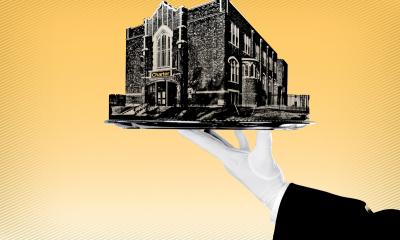Robert Rosenkranz introduces the Intelligence Squared U.S. debate:
Charter Schools Are Overrated
Charter schools, or academic institutions that are publicly funded, but privately operated, have been a part of American life for 25 years, and they have faced a new wave of scrutiny lately, due in part to the appointment of charter school advocate Betsy DeVos as the U.S. Secretary of Education by President Donald Trump. Designed and intended to give students and their families an alternative to a traditional, public school environment, charter schools frequently, but not always, rank high in terms of academics and test scores. They do, however, often rely on resources that may otherwise be reserved for the public-school system, and they also lack the accountability that public schools have, even though they, too, receive government funding. Today’s debate spotlights the American charter school system, with parties on both sides of the equation debating whether charter schools live up to, or fall short of, expectation.
Pre-Debate Poll Results
Prior to the debate, 33 percent of audience members were in favor of the motion, 31 percent were against it and 36 percent were undecided.
Yes, charter schools are overrated.
Arguing in favor of the motion that charter schools are overrated are Gary Miron, a professor within the College of Education at Western Michigan University, and Julian Vasquez Heilig, a professor at Sacramento State and a Founding Board Member of the Network for Public education.
Arguments Made in Favor of the Motion
Many of the arguments made in favor of the motion are based upon the fact that charter schools simply have not done what they were intended to do in terms of meeting certain, predetermined goals. Proponents argued that charter schools were supposed to be locally operated, and that this would ensure accountability within them. Increasingly, however, these schools are being run by private, outside companies, meaning they do not have to be compliant with the performance and other criteria outlined by local school boards. Charter schools were also supposed to create new opportunities for teachers, but one study showed that about 40 percent of new charter school teachers chose to leave their posts within the same year.
Additionally, proponents argued, the academic prowess of charter schools is largely over-inflated. While some charter schools rank higher than public schools in terms of academic performance, many also rank lower. Proponents for the motion also argued that the design of charter schools allows those who run them to essentially cherry-pick their student body, creating something of an unfair advantage – and this practice also contributes to what is essentially a re-segregation of American schools.
No, charter schools are not overrated.
Arguing against the motion that charter schools are overrated are Jeanne Allen, founder and CEO of the Center for Education Reform, and Gerard Robinson, a resident fellow at the American Enterprise Institute and the former Florida Commissioner of Education.
Arguments Made in Opposition to the Motion
Those who argued against the assertion that charter schools are overrated noted that charter school students, as a whole, outperform their public-school peers when it comes to standardized tests. They also downplayed the argument made by proponents that they can “cherry-pick” their student bodies by noting that charter schools accept as many as they can until they are filled, at which point they must have some method of giving preference to certain students over others.
Opponents also countered arguments that charter schools lack accountability by noting that they are most accountable to the communities they serve, and that if they do not perform, they will not have students continuing to seek admission. They also noted that the nature of the charter school system allows these schools to demand more of their staff and student body than public schools, which in turn breeds innovation and can also benefit public schools by encouraging competition.
Post-Debate Poll Results
At the debate’s conclusion, 54 percent of audience members voted in favor of the motion, while 40 percent voted against it and 6 percent remained undecided.




